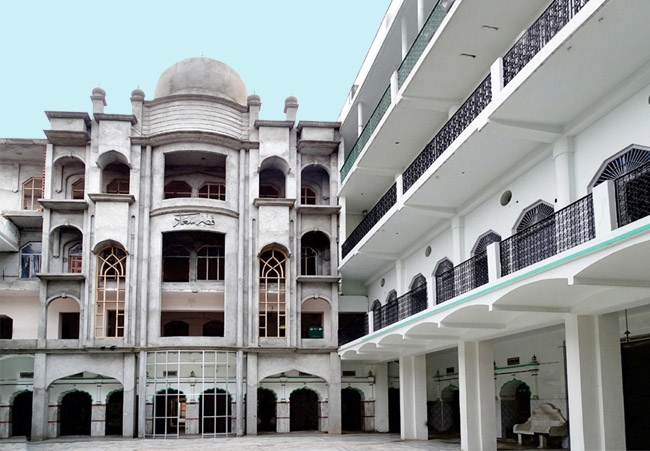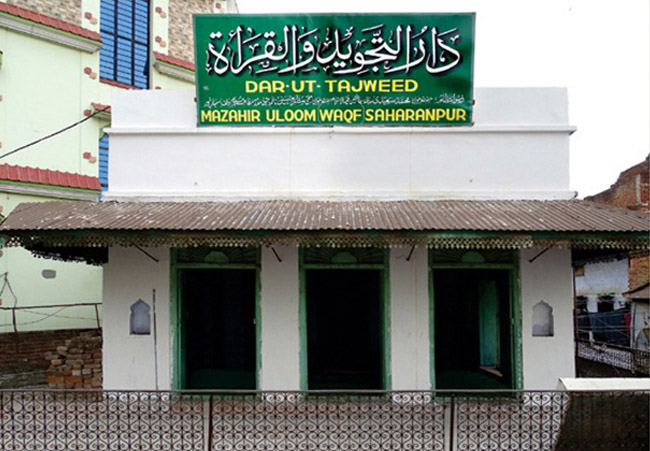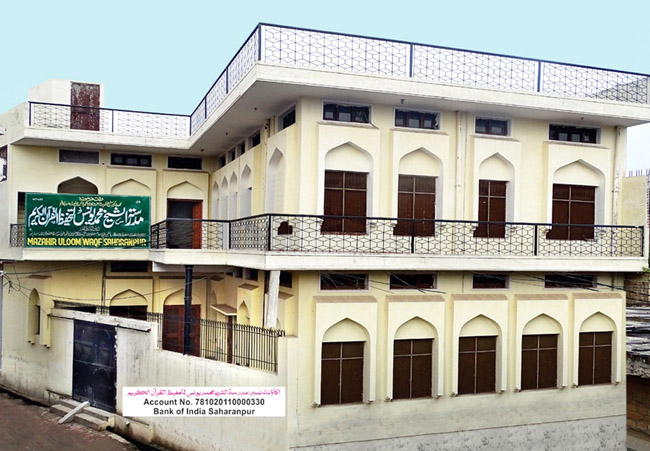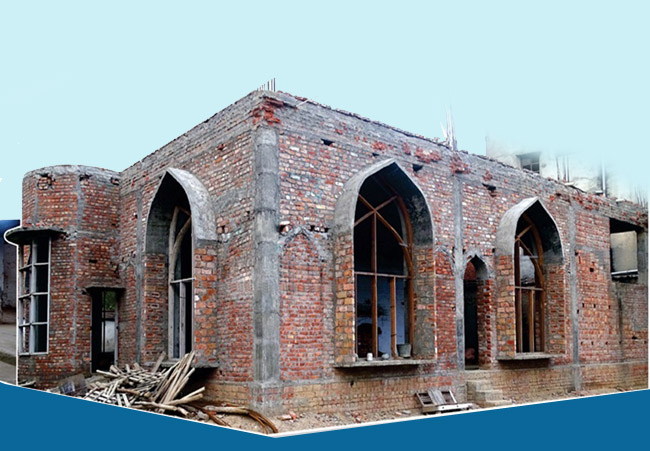Departments
Educational Departments (Talimi Shoba Jaat)
Administration Office (Daftar-e-Ahtimam):
This is the oldest department in the institutions of Mazahirul Uloom. Faqih al-Asr, Hazrat Maulana Mufti Saadat Ali was the first administrator (Muhtamim), followed by several other distinguished scholars who served in the role, including Janab Qazi Fazl-ur-Rehman Saharanpuri, Hazrat Maulana Ahmed Ali Saharanpuri, Hazrat Maulana Inayat-ul-Haq, Hazrat Maulana Khaleel Ahmed Saharanpuri, Hazrat Maulana Abdul Latif Purqazwi Hazrat Maulana Muhammad Asad-Allah Rampuri, and Faqih al-Islam Hazrat Maulana Mufti Muzaffar Hussain. After Hazrat Faqih al-Islam, the responsibility of administration was transferred to Hazrat Maulana Muhammad Saeedi in 1424 AH.
From the beginning, the administration office has been located in the old office of the Madrasa, which continues to adhere to its simple traditions. Over time, this department has held significant importance and centrality. It oversees all other departments, issuing necessary orders and instructions for the faculty, staff, and students, ensuring the preservation and dissemination of the school’s mission. In essence, the organization and management of all departments are conducted through this key department.
Department of Education (Shoba-e-Taleemat):
This department is also one of the oldest. In the early days, when the number of students was small, one person performed multiple tasks. However, as the student body grew, educational levels expanded, and expenses increased, the need for more staff arose.
Notable figures who have served in this department include Hazrat Maulana Abdul Majid Mehsari, Hazrat Maulana Syed Zareef Ahmad Purdawvi, Hazrat Maulana Allama Muhammad Yameen Saharanpuri, Hazrat Maulana Inam-ur-Rehman Thanvi, Hazrat Maulana Syed Waqar Ali Madzillah, and Hazrat Maulana Altaf Hussain Mazahari. Under this department, all academic records, results, and essential information are maintained systematically.
The department manages the teaching of subjects such as the Quran, Tafseer, Usul al-Tafseer, Tajweed, Hadith, Usul al-Hadith, Fiqh, Usul al-Fiqh, Faraid, Balaghah, Ma’ani, Adab, Essays, Insha, Logic, Philosophy, and other Arabic, Persian, and Urdu subjects. It also supervises the teaching at various branches, including the Jamia Masjid Kalan Saharanpur, Khaliliya Branch near Ghanta Ghar, and Ma'ariful Quran Got e Shah. Moreover, the department is responsible for distributing forms for student concessions during vacations, providing blankets and quilts in winter, issuing monthly stipends, and managing quarterly and annual exams.
Department of Finance (Shoba-e-Maliyat):
This is another crucial and fundamental department. The first treasurer (Khazanchi) of the Madrasa was Hazrat Aqdas Hafiz Fazl-ur-Rehman, who was also one of the founders of Mazahirul Uloom. The current building of the old office has a major portion that was gifted by Hafiz Sahib. Over time, the responsibility of this department passed through the hands of various distinguished individuals, including Hazrat Maulana Abdul Wahab, Hazrat Maulana Ikram-ul-Hassan, Hazrat Maulana Abdul Malik, Hazrat Molana Muhammad Irshad Sahib and the current treasurer, Maulana Naeem Ahmad Sahib.
This department manages the registration of donations, funds, and grain received from benefactors, ensures the safeguarding of these resources, and supervises their proper use. It also handles the travel arrangements for ambassadors and the distribution of salaries to employees.
Department of Fatwa (Shoba-e-Dar al-Ifta):
This department is responsible for answering various academic and fiqhi questions received from across the country and abroad. The department was formally established in 1338 AH, though earlier, esteemed teachers and scholars had been providing these services on an honorary basis. Several muftis (jurisprudence experts) are appointed to carry out this task. A copy of all the issued fatwas is kept in a register, and there is a designated mufti to handle the copying of fatwas.
Department of Training for Fatwa Writing (Shoba-e-Mashq Ifta):
Mazahirul Uloom also has a dedicated course for training students in fatwa writing. This course is specifically designed for graduates from other institutions to practice issuing fatwas. Only 25 to 30 students are accepted into this program annually. And interested candidates are required to refer to the admission guidelines or visit the official website for more details or log in to {www.mazahiruloom.org}.
Department of Fatwa Compilation (Shoba-e-Tarteeb e Fatawa):
The collection of fatwas at the Madrasa is an extensive repository of Islamic legal rulings and issues, consisting of 100 thick volumes. Sheikh al-Hadith Hazrat Maulana Muhammad Zakariya Muhajir Madani had a deep commitment to organizing and compiling these fatwas, often expressing in private gatherings that "only two people could organize these fatwas under my supervision: Mufti Mahmood or Qari Muzaffar."
The fatwas of Faqih al-Ummah Hazrat Maulana Mufti Mahmood Hasan Gangohi are a valuable collection, much of which includes the fatwas that he wrote during his service at the Dar al-Ifta of Mazahirul Uloom. May Allah have mercy on Faqih al-Islam Hazrat Maulana Mufti Muzaffar Hussain, who permitted the copying of these fatwas to spread the teachings of his respected teacher and helped the publishers and compilers in this monumental task. This rich collection of legal rulings was published under the name "Fatawa Mahmoodiya."
Although Hazrat Sheikh's wish to compile all the fatwas as envisioned was not entirely realized, Hazrat Faqih al-Islam Maulana Mufti Muzaffar Hussain selected a sincere, devout, and hardworking mufti, Maulana Abdul Haseeb Azmi, for this task. After Maulana Azmi's tireless efforts, the first volume of this golden chain of fatwas, titled "Fatawa Mazahir Uloom" (also known as Fatawa Mazahariya), has been published from the publishing department. Prior to this, the fatwas of Hazrat Maulana Khaleel Ahmad Muhajir Madani were published under the title "Fatawa Khaleeliya."
The Prestigious Project of Fatawa Saeedia
This department is diligently working on the esteemed "Fatawa Saeedia," an exceptional collection of legal opinions by the revered Mufti Saeed Ahmad Sahib Ajrarwi. This monumental work encompasses a total of 10 volumes, with the first volume already published and available to the public. The dedication and scholarly effort invested in this project highlight its significance and the valuable contributions it will make to the field of Islamic jurisprudence.
Department of Specialization in Tafseer (Tafseer):
During the tenure of Faqih al-Islam Hazrat Maulana Mufti Muzaffar Hussain, a special department was established for those seeking expertise in the intricacies and nuances of Tafseer (interpretation of the Quran). Under this department, only the most distinguished scholars and enthusiasts are taught through a dedicated curriculum.
Department of Specialization in Literature (Shoba-e-Takhassus Fil-Adab)
The Department of Specialization in Literature, also known as Shoba-e-Takhassus Fil-Adab, stands as a beacon of academic excellence within our institution. Established a few years ago by the visionary leaders of our institution, this department has been instrumental in fostering a profound appreciation for literature among students.
The department is meticulously designed to provide students with a deep understanding of literary works, theories, and criticism. Our curriculum is thoughtfully curated to include a diverse range of subjects, ensuring that students receive a well-rounded education. In addition to specializing in literature, the department also offers courses in English and Math, enhancing the overall academic experience.
Over the years, the department has been working flawlessly, thanks to the dedication and expertise of our esteemed faculty members. They are committed to nurturing the intellectual growth of our students and guiding them towards academic and professional success.
Students who are interested in pursuing specialization in literature can contact the Madarsa for admissions after completing the Molviat course from any Jamia. Following the finalization of admissions, the department will proceed with determining the curriculum and appointing teachers. Updates regarding the department's progress and activities will be regularly shared through the website and noticeboard, ensuring that students and the community are well-informed.
The Department of Specialization in Literature continues to uphold its tradition of excellence, contributing significantly to the academic and cultural landscape of our institution.
Department of Preservation of Finality of Prophethood (Shoba-e-Tahaffuz Khatm-e-Nabuwwat):
As the name suggests, this department was created to promote and protect the fundamental Islamic belief in the Finality of Prophethood. Recently, the department played a significant role in eliminating the growing influence of Qadianism in Saharanpur. The Qadianis were forced to leave the city due to the commendable efforts of this department.
Department of Quranic Exegesis (Shoba-e-Tafseer Qur’an):
In the past year (2009), when Qadiani literature began to be openly distributed in the city of Saharanpur and Qadianis started to mislead innocent individuals, distancing them from Islam and leading them into their movement, the administration of the Madrasa, led by Hazrat Maulana Muhammad Saeedi, raised awareness among the educated public. Numerous corner meetings were held across the city to warn people about the dangers of this sect and their fundamental beliefs. Additionally, the special edition of the Madrasa’s monthly publication, "Aaina-e-Mazahir Uloom," was dedicated to "Khatm-e-Nabuwwat" (Finality of Prophethood). This series of initiatives continues to yield significant positive results, and lectures and speeches have been arranged through local representatives to protect the faith and character of the people.
Monthly Journal Aina-e-Mazahir Uloom (Aaina Mazahir Uloom):
To spread the voice and message of the Madrasa to its supporters within the country and abroad, Faqih al-Islam Hazrat Maulana Mufti Muzaffar Hussain, during his administration, initiated the monthly journal Aaina-e-Mazahir Uloom in 1988. Hazrat Maulana Inam-ur-Rehman Thanvi was its first editor.
The journal has published several special issues, including:
Faqih al-Islam Number, dedicated to Hazrat Maulana Mufti Muzaffar Hussain’s life and contributions (480 pages).
Muhyi al-Sunnah Number, dedicated to the life and contributions of Hazrat Maulana Shah Abrar-ul-Haq Hardoi (144 pages).
Shaikh al-Adab Number, dedicated to Hazrat Maulana Athar Hussain’s life and achievements (480 pages).
Khatm-e-Nabuwwat Number, a special issue on combating Qadianism in Saharanpur (144 pages).
Department of Dawah and Tabligh :
Through this vital and fundamental department, missionary delegations are sent to different areas with the aim of creating a religious atmosphere through sermons and advice. To achieve this purpose, in addition to the missionaries, the administration and teachers of the madrassa also travel for this cause. Every week, student groups also go to towns and villages.
Department of Library
The significance of this grand library can be gauged from the fact that it contains some manuscripts that are not found anywhere else. The number of printed books exceeds three hundred thousand, and it is a valuable intellectual repository of various sciences and disciplines, representing the glorious scholarly heritage of great scholars, which is truly a part of the inheritance of prophethood. Alhamdulillah, scholars, researchers, writers, pious individuals, and leaders from across the country and abroad regularly visit to gain knowledge. This library has always been highly regarded by eminent scholars. For example, Hakim al-Ummah, Mujaddid al-Millat, Hazrat Maulana Ashraf Ali Thanvi Rh. donated half of his personal collection to the central library of Mazahirul Uloom, not only giving the books but also sending them in a sturdy cupboard to demonstrate both the library's excellent management and his generous spirit. (Similarly, some other prominent figures have also donated their libraries to this repository, details of which are recorded in the madrassa's records.) Under the stewardship of Sheikh al-Arab wal-Ajam, Hazrat Maulana Khaleel Ahmad Majar Madani Rh, during his blessed period, remarkable development occurred not only in the infrastructure and educational advancements but also in the library, with new books being acquired, valuable manuscripts collected, and protective measures implemented for the preservation of manuscripts and books. The previous library building, being cramped, was expanded, and a large hall was added. The efforts of Hazrat Maulana Khaleel Ahmad Mahajar Madani in collecting manuscripts are detailed by Sheikh al-Hadith Hazrat Maulana Muhammad Zakariya Kandhlawi Rh in his autobiography. When the library’s space became insufficient due to the increasing number of books, Faqih al-Islam Hazrat Maulana Mufti Muzaffar Hussain built a new library building, named "The New Library," with the foundation stone being laid by Sheikh al-Hadith Hazrat Maulana Muhammad Zakariya Mahajar Madani Rh himself. (For more details, visit www.mazahiruloom.org) Typically, finding the desired book in large libraries can be a cumbersome task, but here, the system followed makes it much easier. If the name and subject of the book are known, it can be located within five minutes. In the words of Hazrat Maulana Syed Sulaiman Nadvi Rh: “Today, I had the opportunity to visit the library of the Madrassa Mazahirul Uloom. I ordered several books and examined them. The responsible individuals immediately brought the books, showing that the library is well-organized and arranged, with books from every field, including a collection of handwritten books.”
Department of Manuscripts (Shoba-e-Makhtootat):
Alhamdulillah, the Department of Manuscripts at Mazahirul Uloom has 1450 rare and valuable manuscripts, which are carefully preserved using modern and traditional methods. For the preservation of manuscripts, regular participation in special programs at the Rampur Raza Library is organized for the concerned staff.
Anjuman Hidayat al-Rashid
When the winds of heresy and apostasy started to gain strength, and new conspiracies took dangerous forms, movements like the Shuddhi Sangathan and Arya Samaj opened all their doors, leading many Muslims towards apostasy. The annual report of the madrassa for 1349 AH describes the Islamophobic atmosphere, heretical activities, and the conspiracies of Christianity and Aryan movements in the following words: "Dear viewers, the current activities of the enemies of Islam have left no stone unturned in persecuting Muslims. On one side is the growing tide of Christianity, and on the other, movements like Shuddhi and others are openly working to make Muslims apostates and erase Islam not just from India but from the world." In response to this dire need, Anjuman Hidayat al-Rashid was established in 1330 AH for the purpose of strengthening the ability of Muslims to engage in speeches, sermons, and debates. Initially, it was led by Hazrat Maulana Saharanpuri Rh and Hazrat Maulana Abdul Latif Rh. The efforts of its members in protecting Islam from such attacks hold an esteemed place in the history of the madrassa’s Dawah and dissemination of knowledge. With the passing of time, regional student associations have been formed, offering students ample opportunity to participate in various programs and gain knowledge. Every Thursday, these associations are active in their objectives, and twice a month, Anjuman Hidayat al-Rashid organizes debates at the Dar al-Hadith Qadeem, where students specializing in Hadith and Fiqh participate. In addition to regional libraries maintained by these student associations, Anjuman Hidayat al-Rashid also has its own library, which is separate from the central library of Mazahirul Uloom.
Department of Calligraphy (Shoba-e-Khush Khatti):
To standardize students' handwriting, the current head of the madrassa, Hazrat Maulana Muhammad Saidi, established a dedicated calligraphy department, where a large number of students engage in writing practice. This department operates under the guidance of Anjuman Hidayat al-Rashid.
Department of Endowments and Property (Shoba-e-Aouqaf wa Jaidad):
This department is responsible for managing the madrassa’s properties, including rental income, legal matters, and follow-up of court cases related to its assets.
Department of Construction (Shoba-e-Tameerat):
This department oversees the maintenance, repair, and financial management of the madrassa’s buildings, including repairs to doors, windows, tables, desks, etc. Two skilled workers are also assigned to this department for the upkeep of the madrassa's infrastructure.
Department of Electricity and Water (Shoba-e-Barqiyat wa Aab)
This department ensures the proper functioning of the electricity and water systems in all madrassa buildings, with a dedicated technician on-site. The department was officially established by Faqih al-Islam Hazrat Maulana Mufti Muzaffar Hussain Rh on the 1st of Safar 1403 AH. Prior to this, there was no formal department for this purpose.
Recently, a new 200,000-liter water tank has been constructed for the ease of students and staff, ensuring a reliable and ample supply of water for all.
Department of Publication (Shoba-e-Nashr wa Isha’at)
This department handles all correspondence, publication of brochures and booklets in various languages (including Urdu, Arabic, Hindi, English), arranging articles and advertisements in newspapers and magazines, and issuing various religious decrees (such as for Ramadan and Eid). It is also responsible for the madrassa’s general publishing activities.
Department of Organization and Development (Shoba-e-Tanzeem wa Taraqqi)
This department oversees all construction and development activities related to Mazahirul Uloom, including the appointment of ambassadors, division of regions, communication with supporters both in the country and abroad, and ensuring their needs are met.
Department of Matbakh (Mess)
Previously, there was no formal kitchen in the madrasa, and students were given money to manage their food. However, as the number of students increased, the situation became challenging, and in 1337 AH, a kitchen was established. Initially, a small kitchen was set up in the lower part of the old Dar al-Talaba, but due to smoke and space issues, a new building was constructed in the same year, directly opposite the old building. This new kitchen was equipped with facilities for preparing food, office space, and storage for supplies. However, the building is now outdated and needs reconstruction.
Department of Internet (Shoba-e-Internet)
Due to the growing interest and enthusiasm from thousands of scholars and well-wishers of the madrassa both in the country and abroad, the madrassa has launched an official website (www.mazahiruloom.org), available in four languages: Arabic, Urdu, English, and Gujarati. This department also manages email correspondence, provides online fatwas, and handles various news and updates.
Department of Computers
This department, established during the tenure of Faqih al-Islam Hazrat Maulana Mufti Muzaffar Hussain Rh, handles all written documentation, record-keeping, designing of official documents, and the typing and publishing of the monthly magazine "Aina Mazahirul Uloom."
Department of Archive (Muhafiz Khana)
This department manages the storage of all the madrassa’s receipts, registers, vouchers, and important correspondence. The records of all incoming documents and gifts from philanthropists are also preserved here.





